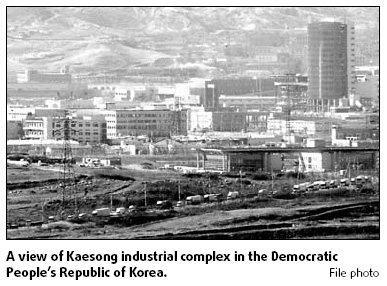Pyongyang, Seoul continue talks

Pyongyang and Seoul met yesterday to continue their discussion on the development of a symbolic joint industrial zone, just days after an exchange of gunfire at sea.
Chinese analysts said the meeting showed both sides are still willing to talk, although differences remain.
Officials met at the Democratic People's Republic of Korea's (DPRK) border town of Kaesong as scheduled yesterday to discuss their joint factory park in the first working-level talks on the issue since July, Seoul's Unification Ministry said.
DPRK officials repeated a demand to put wage hikes on the agenda while the Republic of Korea (ROK) argued the talks must focus on easing border crossings and customs clearances for ROK workers, ministry spokeswoman Lee Jong-joo said.
Since 2004, the Kaesong complex has combined ROK capital and expertise with cheap DPRK labor. About 110 ROK factories at Kaesong employ some 40,000 DPRK workers.
Officials from the DPRK and ROK visited industrial parks in China and Vietnam in December and held discussions in Kaesong last month to assess the joint trip.
"The industrial complex is a symbol of cooperation between the archrivals," said Shi Zhan, a researcher at Beijing-based China Foreign Affairs University.
"Since the two do not want to give up the project, they will not continue to talk on other fields too," he said, adding that the possibility for the resumption of stalled Six-Party Talks is still there.
The meeting on the Kaesong complex came after the DPRK lobbed dozens of shells toward the western sea border last week. The move prompted the ROK to respond with a barrage of warning shots. Pyongyang called it a military exercise, and ROK officials reported no casualties or damage.
Two no-sail zones ordered by the DPRK early last week just before the fracas remain in place, and yesterday the Yonhap news agency in Seoul said Pyongyang issued notices for five new no-sail zones: four off the west coast and one off the east.
Last month Assistant US Secretary of State Kurt Campbell, said Washington is working with the ROK to modernize their defense alliance and must maintain a forward-deployed military presence in the region.
Campbell meets with officials in Tokyo and Seoul this week to discuss bringing the DPRK back to disarmament talks, which Pyongyang quit in April last year.
The US policy is "nothing but an attempt to stifle (the DPRK) by force and to hold unchallenged military hegemony in the region," the DPRK's main Rodong Sinmun newspaper said in commentary carried by the official Korean Central News Agency.
"The dilemma exists," Shi said. "The DPRK wants to discuss on peace treaty, but Washington want to focus on denuclearization talks."
"It's a matter of which comes first. It looks like the two sides continue to test the waters," he said.
Pyongyang and Seoul technically remain in a state of war because their three-year conflict ended in 1953 with a truce, not a peace treaty. yesterday, the DPRK repeated its call for a peace treaty.
President Lee Myung-bak told the BBC in an interview aired Friday from Davos, Switzerland, that a meeting with DPRK leader Kim Jong-il "could probably" take place within the year.
Kim met Lee's two predecessors in summits in the DPRK in 2000 and 2007. Lee, however, has taken a hardline approach toward the DPRK since taking office in 2008.
(China Daily 02/02/2010 page11)














